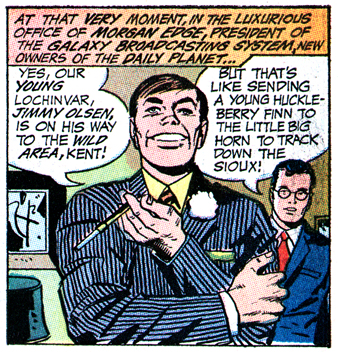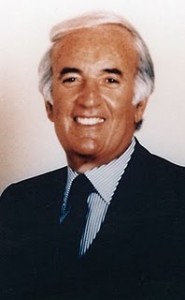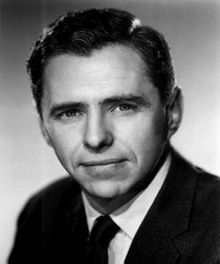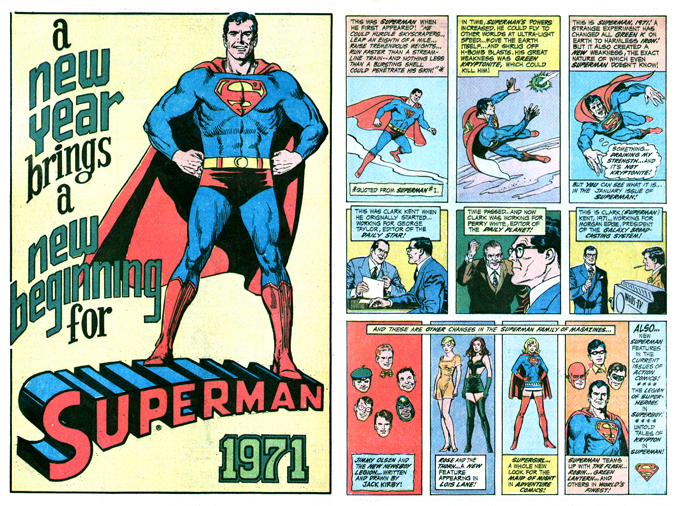 An inspired updating of the Superman mythos took place when the Man of Steel’s über-editor Mort Weisinger was stepping down at DC in the early 1970s and newly-arrived artist/writer/editor Jack Kirby introduced sinister corporate takeover mogul Morgan Edge as now-TV reporter Clark Kent’s boss. (Technically, Murray Boltinoff was listed as JO editor, but that wouldn’t last too long.) Edge is a slick, devious, urbane and, we soon learn secretly (in JO #134), agent of the most malignant force in the universe, Darkseid, relentless seeker of the Anti-Life Equation, to boot!
An inspired updating of the Superman mythos took place when the Man of Steel’s über-editor Mort Weisinger was stepping down at DC in the early 1970s and newly-arrived artist/writer/editor Jack Kirby introduced sinister corporate takeover mogul Morgan Edge as now-TV reporter Clark Kent’s boss. (Technically, Murray Boltinoff was listed as JO editor, but that wouldn’t last too long.) Edge is a slick, devious, urbane and, we soon learn secretly (in JO #134), agent of the most malignant force in the universe, Darkseid, relentless seeker of the Anti-Life Equation, to boot!
Edge, who was a clothes horse, always dressed to the nines in snappy, pin-stripped business suits, would appear as foil in all the Superman family books, particularly in Superman’s Girl Friend, Lois Lane, but, when DC was losing confidence on the Fourth World titles, the duplicitous CEO would fade from the comics line. But while he was with us, sporting a perennial cigarette holder and decked in a shyster’s pin-striped suit, Edge kept the entire cast perpetually on… edge!
In the New York Times Magazine article on the relevancy in Marvel and DC comic books (“Shazam! Here Comes Captain Relevant,” by Saul Braun, May 2, 1971), the writer describes the Earthling allies of Apokolips: “…[I]n support of Darkseid are middle managers and technocrats of the Establishment, like Morgan Edge, a media baron who treats his new employee Clark Kent — now a TV newscaster — abominably.”
On the FB community page, Gary Leach mentions Edge wasn’t just a minion of the Evil One: “In spite of being an agent of Darkseid, [Edge] did seem genuinely interested in the Earthly fortunes of GBS (which we learn later to be a prime example of the acorn not falling very far from the tree).”
 I’ve sometimes wondered, not too seriously, if Jack had based Edge on a real-life media tycoon, particularly the remarkable Steve Ross, the entrepreneurial wheeler-dealer who would eventually head the Time Warner Inc. communications empire. Just because I’m crazy like that, indulge me with this side-talk on Ross and his relationship to DC Comics, and maybe (just maybe) why there are similarities between Steve and Morgan:
I’ve sometimes wondered, not too seriously, if Jack had based Edge on a real-life media tycoon, particularly the remarkable Steve Ross, the entrepreneurial wheeler-dealer who would eventually head the Time Warner Inc. communications empire. Just because I’m crazy like that, indulge me with this side-talk on Ross and his relationship to DC Comics, and maybe (just maybe) why there are similarities between Steve and Morgan:
In the mid-’60s, National Periodical Publications, a.k.a. DC Comics, consisted of three divisions: comics publishing, magazine distribution (Independent News Co.) and the recently acquired licensing arm (Licensing Corporation of America), which licensed DC characters to Hollywood, television producers, toy manufacturers… anyone, basically. The cultural explosion of the Batman TV show, a phenomenally successful, if shortlived series, made NPP a very attractive possible acquisition. The rapidly growing Kinney National Services (parking lots, limos, cleaning services, and other ventures, including funeral homes) was a company interested in merging with companies which catered to the leisure time of Americans. (Economists believed, during that era, we’d have to work only four days a week and have pah-lenty of idle time (right!).) Magazine distribution (IND, the most lucrative aspect of NPP) fit right into that prediction. So, for a cool $60 million, Kinney snapped up the House That Superman Built, in 1968.
The head of Kinney was Steve Ross, a bon vivant as colorful as any comic-book character and, in some ways, not unlike King Kirby. Born into poverty in Brooklyn’s tough Flatbush neighborhood, when Ross (birth name: Steven Jay Rechnitz) was a teen, quoting his 1992 New York Times obituary: “[H]e was summoned to his father’s deathbed to learn that his sole inheritance consisted of this advice: There are those who work all day; those who dream all day, and those who spend an hour dreaming before setting to work to fulfill those dreams. ‘Go into the third category,’ his father said, ‘because there’s virtually no competition.'”
Ross took the advice and, starting out as a particularly charming undertaker at his father-in-law’s funeral home, went on to create and head the largest communications conglomerate in the world, Time Warner, which remains the parent company of DC Comics. His achievements are amazing, his personality larger than life…
(There is no evidence, per se, that Ross was like Morgan Edge in being an agent for a great malevolent force, but it’s interesting to learn he was dogged to the end of his days of being, to again quote the NYT obit, “the subject of persistent innuendo involving a case in which two senior Warner executives, close friends of Mr. Ross, were convicted for their part in a racketeering scheme involving a mob-connected theater in Tarrytown, N.Y., a suburb of New York City.” Kirbyophiles may want to know that one of those “senior Warner executives” was onetime LCA head Jay Emmett, nephew of Jack Lebowitz, the former owner of National Periodical Publications… T’is a fascinating story…)
 (Tom Stewart, in the reply section, suggests the real-life Edge prototype just might be early ’60s Columbia Broadcasting System president James Aubrey, who shared with GBS President Edge the nickname “The Smiling Cobra”! Judging by the info on the Wikipedia page, our friend just might be correct! Nice catch, T.S.!)
(Tom Stewart, in the reply section, suggests the real-life Edge prototype just might be early ’60s Columbia Broadcasting System president James Aubrey, who shared with GBS President Edge the nickname “The Smiling Cobra”! Judging by the info on the Wikipedia page, our friend just might be correct! Nice catch, T.S.!)
But I digress…
Galaxy Broadcasting System (GBS), the conglomerate headed by Edge, was a perfect updating as a relevant place for Supe’s alter ego, reporter Clark Kent, to hang his hat. It was, after all, the Age of TeeVee, and broadcast news was king. Is this a linking of the merger mania of that time with the ruler of Apokolips? Stay tuned!



Jon,
Another interesting post.
Morgan Edge, without doubt for me, one of the all time “love to hate ’em” characters.
I’m in the dark on Ross, and I’ll be reading up on him as a result of your tip.
Edge probably was a conglomerate himself based on Kirby’s experience with publishers while working in the industry, as well as his recent dealings with Perfect Film while at Marvel.
Take a look at Jack Liebowitz as an Edge prototype. Liebowitz testified for Jack Schiff against Kirby, DC had become a small part of a much larger media company by the time Kirby signed with DC, and Liebowitz had become a major player at Warner.
While Edge had connections to INTERGANG, Liebowitz had his own connections to “organizations.”
The book Men of Tomorrow by Gerard Jones describes the mob connections to early comic book publishing on pages 41-62.
Francesco Castiglia (Frank Costello) saw a role for Harry Donenfeld (DC publisher along with Jack Leiobowitz). Castiglia (Costello) saw himself as a modern American free of the prejudice that pitted Italian against Jewish street gangs. His wife was Jewish and his closest friends were one fellow Sicilian, Salvatore Lucania (“Lucky” Luciano), and two Jewish street kids, Benjamin (Bugsy) Siegel, and Maier Suchowljanski (Meyer Lansky).
Costello was friendly with Donenfeld, who often bragged of their friendship, and Costello used Donenfeld’s printing business as a way to smuggle Canadian liquor into the United States among the trucks legitimately importing Canadian paper for Donenfeld’s printing business. The liquor was brought in on the same trucks as the paper and stored in the same warehouses. Donenfeld’s printing business was perfect for liquor distribution as well because the printer did business with magazine distributors, who sold goods to newsstands, tobacco shops, and drug stores, the same places where a person could purchase under-the-counter booze.
Harry Donenfeld and Jack Liebowitz were Independent News at the time the company acquired DC. In fact, based on my reading, Liebowitz was pretty much the mastermind who ran both companies.
I doubt Liebowitz was very concerned about comic books by the time he ended up on the board of Warner.
Men of Tomorrow has a great deal of information about Liebowitz.
“In 1954 Jack Liebowitz learned New American Library was looking for a distributor to replace Facet. Independent News had no experience with major magazines or large book publishers, but thanks to Superman was able to get product everywhere. Liebowitz out negotiated bigger distributors and picked up the New American Library account.”
“In one stroke half the remaining comic book companies lost their distribution. Martin Goodman was about to close his doors when Jack Liebowitz said Independent News would be willing to carry him. Liebowitz put Goodman on a strict regime of eight titles a month.
Liebowitz had two more acquisitions to make in the chaos of the moment. One was Mad magazine. [Mad publisher] Bill Gaines would have liked to have been distributed by anyone but Jack Liebowitz, but the alternative was going out of business. Gaines expected Liebowitz to give him grief, but Liebowitz was a businessman. Gaines said, “He gave me the cleanest contract you’ll ever see, and mentioned nothing from the past.”
Liebowiz’s other major acquisition was [scoring distribution of] Playboy magazine. It was doing well, better than the other girlie magazines out there, but confined to a limited market. Liebowitz saw something in Hefner’s ambition to make the magazine slick, and legitimate. Liebowitz noticed Hefner would pour his money back into the magazine, an unheard of practice among skin magazine publishers (remember [Harvey] Kurtzman’s satire in Goodman [Beaver]? Mr. Schlock?). Hefner believed in Playboy the way Henry Luce believed in Time magazine.
Liebowitz made the decision to stretch Independent’s budget to acquire the Playboy distribution contract.
Jack Liebowitz had learned how to survive among the hustlers of the pornography business in the ’30s. Now he had become a master of the efficient corporate culture.
In 1970, Liebowitz took a place on the Warner board of directors. Through aggressive stock acquisition he increased his share in the firm until he became one of the largest individual shareholders in Warner Communications.
Jon,
Just looking at the Jones book Men of Tomorrow, I see he did mention Ross on pages 310-313.
Interesting that Ross had many of the same Mob connections as Liebowitz and Donenfeld.
In describing some of the shadier business practices employed by Ross, the author [Connie Bruck] of Ross’s biography [Master of the Game, Simon & Schuster, 1994] quotes a business associate of Ross as saying cryptically, “I once saw $100,000 in a brown paper sack left on someone’s desk to settle a problem.”
Ross acquired Warner Brothers from Elliot Hyman, a business associate of famed mobster Meyer Lansky, who was well-known to Donenfeld, and Liebowitz.
According to the Ross biography Hyman and other executives on the Warner board “…had come up from the Lansky mob. They were unreconstructed racketeers, casino builders, and race track fixers.”
After the sale to Ross, Liebowitz, and other high ranking DC executives took key positions as part of the conglomerate.
The Fourth World. It’s rich stuff, and the more you read about Kirby and his life, the more fascinating the bigger picture he was drawing becomes.
Awesome work, Patrick! You’re adding immeasurably to this blog and I can’t thank you enough!
Jon, just reading Ross’s biography in MoT… a perfect fit. Not only that, the changes Ross made on acquiring DC led to Kirby’s return!
Hey, Joh!
Edge was based (or so I’ve heard) on James Aubrey, head of CBS, and a man loathed in the business. Jack even copped Aubrey’s nickname, “The Smiling Cobra,” for Edge. Later they made use of Edge in the Superman comics, after Jack had gone, but not as much.
Call me Jon, Thom… (Those pesky “h”s, huh?)
I’m on the research hunt right now! Thanks for the tip, Perry!
You’re right, too: Not so much…
By George, I think you’re right, Tom! “The Smiling Cobra,” indeed!
Please, Edge fans, check out the James Thomas Aubrey, Jr. entry at Wikipedia…
Pingback: Day Four: The Wild Area! | 365 Days of Jack Kirby's Fourth World